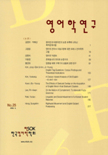존재동사의 의미와 논항구조
The Meaning and Argument Structures of Existential Verbs
- 한국영어학학회
- 영어학연구
- 영어학연구 제25호
-
2008.0659 - 79 (21 pages)
- 232

The objective of this study is to explore variety of meanings which are relevant to argument structures with respect to existential verbs with special reference to ‘iss" in Korean. Korean existential verbs(EVs) are ambivalent between the categories of adjective (in this study stative EV) and verb (in this study non stative EV). The verb ‘iss’, corresponds to such English words as ‘be", ‘have", ‘possess", ‘stay’, ‘be located", ‘take place’, and ‘happen". There is a systematic relationship among existence, location, possession, and occurrence, and that Korean EVs cover a variety of semantic ranges. The notion of existence, location, possession and occurrence in terms of thematic structures existing between an EV and associated actants. Existence is defined as the meaning that is derived from the relationship between an EV and a theme which is an obligatory entity as its external argument.
1. 서론<BR>2. 존재동사의 이론적 배경과 동향<BR>3. 논항의 의미역과 의미관계<BR>4. 결론<BR>참고 문헌<BR>
(0)
(0)